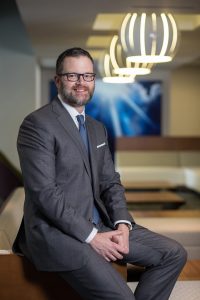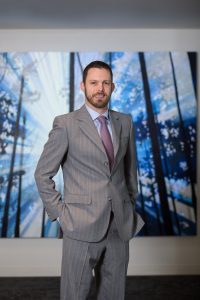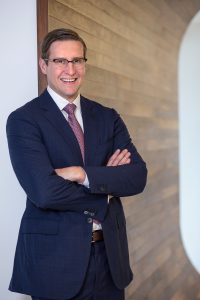© 2018 The Texas Lawbook.
By Natalie Posgate
(April 11) – On Tuesday, a federal jury in East Texas returned a $502.6 million verdict against Apple for infringing technology used for secure communications in its iconic iPhones.
The verdict is the latest — and not even the costliest — in a string of court challenges to Apple’s use of patents held by VirnetX, a Nevada-based tech company.
VirnetX has claimed that Apple wrongly appropriated technology vital to the popular FaceTime feature in the iPhone. Tuesday’s jury verdict ended the fourth round in a series of patent disputes between the two companies that are far from over.
But wrapped inside the history of their litigation is the emergence of a Dallas litigation boutique that is beginning to draw national attention for their successes against the company Steve Jobs made.
Meet Caldwell Cassady & Curry, a firm of young litigators making more than a just living taking big, voracious bites out of Apple.
One day in early 2013, a couple weeks before they were departing McKool Smith, Jason Cassady and Austin Curry took a visit to the Bank of Texas.
They were opening an account for Caldwell Cassady & Curry, the new law firm they were starting with McKool colleague Brad Caldwell.
Curry asked the manager who the bank’s biggest client was, “because we’re going to be your biggest client.”
“Finally he says, ‘OK, you need $50 to open your account. How do you want to fund the account?” Cassady recalls.
The two lawyers looked at each other.
Cassady had $30 in his wallet. Curry had no cash. They scrounged $20 from an ATM and handed it to the bank manager to open their account. “We were like, ‘Good thing we’re not in front of a client right now.’ ”

Five years later, it’s safe to say Caldwell Cassady & Curry is giving the bank’s other big clients a run for their money. In the first few years of the Dallas firm’s existence, the lawyers have scored more than $1 billion in patent infringement verdicts against Apple alone. They’ve also won against other household names in tech like Samsung ($15 million).
They won $50 million in a founder dispute between a Missouri professor and the owners of Square, the maker of the mobile credit card processors found in hipster coffee shops. And just last November, the firm successfully defended property owners along the Red River against a federal seizure of 90,000 acres based on faulty historical land surveys.
More high-profile verdicts could be in the horizon. Aside from this week’s trial in East Texas for the latest round of the VirnetX v. Apple patent battle, the lawyers have also filed a federal lawsuit in Waco on behalf of Tinder’s parent company, Match Group, alleging that rival dating app Bumble infringed on Tinder’s patent for “swipe right” technology.
Bites out of Apple
Perhaps most notably, the firm represents a group of iPhone customers in a case against Apple for allegedly breaking FaceTime in 2014 to force owners of older iPhones to upgrade to their new operating system. U.S. District Judge Lucy Koh is currently deciding whether to certify the lawsuit as a class action.
A group of plaintiffs led by California resident Christina Grace alleges that Apple purposely broke FaceTime in 2014 several months after the release of iOS7, its iPhone operating system. The breakage forced customers using iOS6 and earlier to update to iOS7 (which caused older iPhone models to slow down significantly) or purchase a newer model.
If Caldwell Cassady wins this case, it could lead to more legal troubles for Apple in dozens of other lawsuits that have surfaced since late last year, when the company admitted it had slowed down older iPhone models to preserve battery life.
In one of Caldwell Cassady’s previous VirnetX v. Apple cases, evidence was produced directly contradicting Apple’s public statements in the battery life incident.
“We have never – and would never – do anything to intentionally shorten the life of any Apple product, or degrade the user experience to drive customer upgrades,” Apple published on its website on Dec. 28, 2017.

In the Grace case, which was filed in early 2017, the plaintiffs claim Apple broke FaceTime to reduce its own operating costs. Connecting FaceTime calls on iPhones with iOS6 or earlier required connection with relay servers, a connection that required hefty monthly payments to the company that owned the servers.
According to court documents, evidence emerged during a February 2016 trial that Apple employees purposely broke FaceTime, and did so with indifference. Senior software engineer Thomas Jansen testified that Apple had planned to break FaceTime on April 16, 2014. “Today’s the day,” an internal email sent by former Apple Senior Security Engineering Manager Andrew Whalley said.
Likewise, when Apple engineering manager Patrick Gates wrote to personnel seeking a reminder on the details of the April 16 FaceTime break, Apple engineer Gokul Thirumalai responded, “We broke iOS 6, and the only way to get FaceTime working again is to upgrade to iOS 7.”
Another email that emerged in the Grace case suggests Apple’s manager of operating security at the time was not amused, “[L]et me just voice my concern here. Maybe someone can talk me off the ledge by convincing me this is not as big a deal as I think.”
For Apple, it was a cure that has proved worse than the original disease. Apple had begun using the relay connection for most FaceTime calls following a 2012 jury verdict that found Apple was infringing on patents owned by VirnetX. The evidence that Caldwell Cassady & Curry presented in its complaint for the Grace case surfaced in a second trial involving VirnetX in 2016, when an East Texas jury awarded VirnetX $625 million for infringement on its patents for FaceTime and VPN On Demand technology. This week’s verdict is the VirnetX trial team’s fourth courtroom face-off with Apple.
No one at the firm would comment on any of the Apple litigation specifically, but Curry is quick to point out the firm is not on “some moral campaign against Apple.” Whether they’re against Apple or another tech giant, Curry says he’s been inspired to take on these kind of patent cases to make sure the right people are being recognized for their inventions – not an easy feat.
“When I was growing up, inventing something or being an inventor was a big deal,” Curry said. “It was the American dream. Brad and I both went to engineering school and it’s just a really demanding, hard discipline.”
Having the patent office’s stamp of approval on an invention is even more difficult. “Not every engineer goes on to have a great idea and get a patent for it,” Curry said.
When he worked as an intern at Texas Instruments, Curry said most engineers who had patent-approved inventions would frame the patents and mount them in their offices.
“It’s a big point of pride for them, as it should be,” he said. “The moral aspect of it for me is representing people like VirnetX, and the inventors for VirnetX are just really good people.
“Dr. Bob Short, who is one of the main inventors on the VirnetX patents, is just a solid, decent guy,” Curry added. Curry said Dr. Short lives on a farm in Virginia with his wife of many years, “and every time I see him, he brings me some honey from his farm and it’s the best tasting honey you will have ever had.”
Anything but conventional
Though the lawyers have won cases that on paper would look like were only pulled off by middle-aged white guys at traditional large law firms, Caldwell Cassady is not your typical firm. Everyone but Cassady is under 40. To any nineties kid’s delight, the three conference rooms in the firm’s offices are named after rappers – the Wallace Room (Notorious B.I.G.); the Carter Room, or East Coast conference room (JAY-Z); and the Broadus Room, a.k.a. the West Coast conference room (Snoop Dogg).
“We need one that faces North,” Caldwell said. “We desperately need a Drake conference room.”
The 11-attorney group celebrates winning trials via a group outing for paintball or bubble soccer – and “go-karting is probably on the list soon,” Cassady says. They have a lounge in their office so they can sip WhistlePig Rye while discussing their cases. Late nights at the office are brought to you by takeout from Pecan Lodge, one of Dallas’ finest barbecue institutions.

And unless they’re in court or they need to “dress to impress,” don’t expect to see them in a suit at work. On a Tuesday afternoon in February, for instance, all three founding partners were in jeans at their offices in Rosewood Court. Caldwell and Curry were sporting sweaters – Caldwell’s a solid navy blue, Curry’s featuring tigers. Cassady wore a dark graphic “Ender’s Game” T-shirt.
While chatting in the ‘Biggie’ Wallace conference room, the lawyers said they decided to start their firm in January 2013 after VirnetX approached Cassady about leaving McKool Smith to go in-house. VirnetX wanted to build on their go-to lawyers who would not have as many potential conflicts in taking on their cases.
Cassady preferred starting a new firm. He and Curry left McKool first and Caldwell joined a few weeks later. Caldwell, who was the hiring partner at McKool, said leaving his colleagues at McKool was the “furthest thing from my mind” when Cassady and Curry asked him to join them.
“I didn’t want to leave a lot of the folks that I recruited over there,” he said. “I know I could stay there and be happy and continue to learn a lot, but five or 10 years down the road I would look back and kind of wonder what it would have been like if I had gone to try at this firm, and I didn’t want to just wonder.”
The lawyers left McKool Smith on good terms. In fact, a couple months after joining Cassady and Curry, Caldwell tried a case against Samsung with his former McKool colleagues.
Curry said he still goes to lunch with shareholder Doug Cawley, whose office was next to his at McKool and whom he considers his mentor.
“We’ve kept a really good relationship with them,” Caldwell said. “With the utmost respect, I hope we get to try a case against them because I think that would be really fun.”
They might get their chance sooner than they thought; court filings indicate that Dallas McKool Smith principals Theodore Stevenson and Steven Wolens are the attorneys representing Bumble in the new lawsuit filed by Tinder.
When it came time for the lawyers to grow their new firm, they got some leads through contacts: a federal judge had a clerk interested in taking a different path from the big firm route. That associate called a friend he had clerked with at the Texas Supreme Court and convinced him to join too. A couple other hires happened through the “friend of a friend” route, the lawyers said.
“I think we’re pretty maxed out on the buddy system now,” Curry said. “What we are interested in more than anything is people that are very competitive that are disgusted with losing, and that’s just because that’s how we are.”
Caldwell adds: “By and large we really enjoy trial. Most of the folks here like that moment in the spotlight. They appreciate the responsibility of having such an important decision for our client come down to how well we can actually perform in court.”
Cassady says he expects the firm to add one or two more next year. In terms of how many attorneys the firm would like to grow to, the named partners say they’d prefer to keep it on the smaller side.
“When you keep the firm a little smaller, that extra boost of not wanting to lose is sort of fueled by how close you are to the other people you work with,” Caldwell said. “You can’t help but have a touch more indifference if something gets too big.”
Though passion in the courtroom is a must for these lawyers, they apparently draw the line at ditching devices made by their courtroom rivals.
Asked if they ever feel so fired up about their cases against Apple that they consider boycotting their own Apple products, Caldwell pointed at his Batman-sported MacBook laptop and responded, “I promptly cover up the [Apple] logo with the Dark Knight sticker.”
Curry’s answer was a bit more lawyerly: “I actually really respect a lot of things that Apple does and I respect their products. I was one of the first people that bought the very first iPhone and I’ve had iPhones ever since then.
“And it’s also helpful to have a very good familiarity with how their products work and the different features for our cases, so I’m not needing to switch over to an Android anytime soon.”
Adds Caldwell: “There was a point when I think we were active in cases against Apple, Samsung and Microsoft… at some point I need to be able to call my kids.”
© 2018 The Texas Lawbook. Content of The Texas Lawbook is controlled and protected by specific licensing agreements with our subscribers and under federal copyright laws. Any distribution of this content without the consent of The Texas Lawbook is prohibited.
If you see any inaccuracy in any article in The Texas Lawbook, please contact us. Our goal is content that is 100% true and accurate. Thank you.
